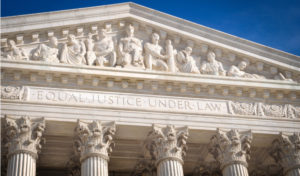
By Brandon Bourdages @ Shutterstock.com
Forced unionism has been a problem for many American public sector workers. With a 1977 Supreme Court precedent backing them up, union bosses were able to reach into the pockets of employees who weren’t even members of the union and extract dues money to use for campaigning. This was forced speech. The court finally overturned the precedent yesterday, taking a big step toward ending forced unionism for public sector workers. With the Supreme Court’s recent decision in Janus vs. AFSCME, workers will be given an advantage they didn’t previously have. The Editorial Board of The Wall Street Journal reports on the decision:
The Court saved its most anticipated decision for last as a 5-4 majority in Janus v. Afscmeoverturned the Court’s flawed 1977 Abood decision that allowed states to require workers who don’t belong to a union to pay “agency fees” to support collective bargaining. As Justice Samuel Alito explains in the majority’s opinion, Abood is an anomaly in the Court’s First Amendment jurisprudence.
Conservatives on the Court have been chipping away at Abood for some time. In 2016 the Court heard a case by California teacher Rebecca Friedrichs to annul Abood. But Antonin Scalia’s death resulted in a 4-4 split. President Trump’s appointment of Justice Gorsuch last year has now allowed the Court to rectify its 40-year constitutional error.
Credit is due Illinois Governor Bruce Rauner who had the courage to launch the challenge while tangling with the state’s formidable government unions. After a district court ruled that the Governor lacked standing, child support specialist Mark Janus intervened, claiming the American Federation of State, County and Municipal Employees (Afscme) used his agency fees to advocate for government policies that he opposed.
Mr. Janus was charged for the union’s lobbying, advertising, membership conventions and other services unrelated to collective bargaining. The union also bargained for wage and tax increases, which are political questions since they affect the public fisc. Other government unions have taken positions in bargaining on climate change, sexual orientation, gender identity and minority religions.
The Warren Burger Court based its creaky Abood decision on two cases involving private employers, which are not bound by the Bill of Rights. But a government’s compulsion of speech raises significant First Amendment concerns. “The idea of public-sector unionization and agency fees would astound those who framed and ratified the Bill of Rights,” writes Justice Alito.
Read more here.
Some states were already protecting workers’ rights before the Janus decision. View the Richardcyoung.com Liberty & Freedom Map below:
[mapplic id=”33647″]
National Unemployment Rate: 3.8%
Victory: Janus v. AFSCME Supreme Court opinion
Originally posted on Yoursurvivalguy.com.






